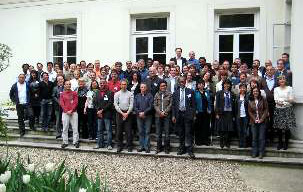
Dr. Farhad Asdaghi
Editor's Note: This is the story of Roofia Shahidi-Asdaghi. Her father, Mr. Ni'matu'llah Katibpur-Shahidi was arrested in Mashahd and transferred to the prison in Kashmar, where he was put to death with a firing squad after 23 days on July 25, 1981. Her husband, Dr. Farhad Asdaghi, was a member of the third National Spiritual Assembly of the Baha'is of Iran elected after the Islamic Revolution, who was put to death by hanging on November 16, 1984. Translated by Gloria Yazdani
By Roofia Shahidi-Asdaghi
24 years has since passed; yet it seems like it was yesterday when — together with my one-year-old son and my mother-in-law — we ventured into the Evin prison, hoping to visit with my husband. We had only been able to see him twice since his arrest, with one visit being two weeks apart from the other.
Two weeks earlier, too, we had been given a visitation schedule, which never transpired. Going through a process of what seemed like a multi-tier obstacle course, we had reached the visiting room; only to hear from the authorities that my husband was not there and that a meeting was not possible. Our insistence and pleadings were of no avail; and unfortunately — although it was difficult to accept what they were saying and even harder to endure not being able to see my husband — we had no choice but to submit to their word. They asked me to wait for their call and promised to set up another visit soon.
Another two-weeks elapsed, during which time I never left our home fearing the authorities may call and I would not be there to receive the call. Every time the phone rang, I ran to it excitedly hoping it would be the prison authorities fulfilling their promise… But, alas, the call never came…
That day, we had set out again for Evin with eager anticipation, longing to sooth our aching hearts with a visit after an entire month of being in the dark about my husband's condition. This time, they told us from the very beginning that we could not have a visit that day… But I kept insisting and explained the process we had already endured. I also told them that we were not leaving the prison without seeing my husband, and that we would stay there all night if necessary.
Seeing that I was in great turmoil, the man in charge of visitation gave me a telephone number, asked us to leave the premises, and said that if I were to call him after an hour he might be able to do something…
Once again, I submitted and trusted in the man's words… We spent an hour outside and then called the number from a public telephone booth. He first put me through a few questions to ascertain my identity and, once he was confident of who I was, he informed me that they had executed my beloved, young, husband the night before! I realised that he could have communicated this devastating news in prison; but that he had been concerned about our reaction in front of the others, and had sent us away…
I don't know how to describe my feelings of that moment… Neither the tongue is able to recount my devastation; nor can the pen describe my anguish… My legs were numb and unable to bear the weight of my body; and, while I was leaning against the wall inside the telephone booth, I was struggling with how I could communicate the news to my mother-in-law… A mother who had come to visit her beloved son, only to receive news of his execution…
When we went to Behesht-e-Zahra[1] Cemetery to enquire about the whereabouts of my husband's gravesite, they gave us the address for a place called "Khatoon Abad", which was given the nickname of "Kufr Abad"[2], and it was a place where those who were executed were usually buried. This place later also became known as the "Khavaran Cemetery" because it was situated on the Khavaran[3] roadway. They gave us a plot number and told us that my beloved husband was buried there; but, alas, upon arriving there, we realised that the gravesite belonged to another family's loved-one who had been executed a while back.
I never discovered where my husband was buried, and exactly which part it was — within the immensity of the plain of Khavaran — that was embracing his blessed corps… They did not even give us his lifeless body, so that we might wash it according to the laws of the Faith which he had espoused; recite Baha'i prayers upon it; and bury it with due respect…
We were never told about his plight, and never knew how he was tried and executed… Oh how I wish they could have at least returned his wedding band and his watch to me; so that I could have saved them as mementoes for his son, who was a mere infant of one year and four months at the time…
How I wish I could have seen his last will and testament, so that — even if I were deprived of beholding him during his last hours on earth, I could have at least been privy to his last wishes… Oh, how I wish I could have been there in court for his trial, which had been conducted behind closed doors and without any access by him to a lawyer or to the least of any privileges that constitute the most basics of human rights.
I wish I could have been present there to see how the judge could have sat in such judgment and on what testimony or evidence he had rendered a death-sentence on a young physician who entertained no other desire in his heart but to be of service to the needy and to his countrymen, and who had in fact lived up to his desire in his short earthly life…
Oh, how I wish I could know if the judge, when signing the death sentence, gave any thought — even for a fleeting, ephemeral, moment - to the innocence of the young man sitting before him… Did he even give ear to his words for only a few brief minutes? Or did he look into his pure, innocent, eyes for a passing instant?
Years of bitter separation passed, one after the other! Ah, but how difficult did they pass! Nevertheless, they passed, and throughout all these years, every time I went to the Khavaran Cemetery - which is also home to the remains of many of our compatriots and of about 50 or 60 other Baha'i martyrs - I would raise my suppliant hands in prayer at his traceless, nameless, grave and would wish in my heart that I would one day discover the exact place where his body had been put to rest. I longed to find his resting place, so that his offspring, who had now grown into a fine young man, would know where in this vast space his father, who had committed no crime but service to mankind and had rendered up his life in this path, was buried.
But now I remain with no recourse but to bemoan and lament the futileness of my desire, for after all the years of such longing, I now hear that they have bulldozed the cemetery and whipped the land clear of even the trees that had been planted there; so that even the most minute traces of him and the others there might be removed…[4]
I now bewail in my heart and shed tears of anguish and cling to the words of Simin Daneshvar[5], who in her book "Suvushun"[6] says:
"Cry not my sister! A tree will be planted in the courtyard of your home and — in your city — other trees will rise up; and then many more in your nation! And the breeze will waft across the land and deliver the tidings of one tree to the other; and the trees will ask the breeze: Did you see the "DAWN" along your way…?"
Notes:
[1] Largest cemetery in Tehran
[2] Literally meaning "the land of blasphemy"; the cemetery became known by this name because it was first a cemetery where non Muslims such as Hindus, Jews and Christians were buried. However, later it became a dumping ground for religious and political martyrs.
[3] In 1988, the cemetery was used as a mass grave for thousands of corpses belonging to political prisoners who had been executed.
[4] On 25 January 2009, it was reported that the Khavaran Cemetery had been destroyed by the order of the Islamic Republic
[5] Simian Daneshvar was perhaps one of the very first women novelists in Iran and is referred to by many as "the mother" of Iranian novelists
[6] The word "Suvushun" [Shirazi dialect] comes form "Sug-e-siyavushan", which means lamentations or mourning for Siyavush (a character in Ferdowsi's epic Shahnamih). The book is a novel (one of the most successful Iranian novels to date) about tribal life in and around the author's hometown of Shiraz.
Persian Translation: 24 Years Ago (Persian Version PDF)











 A poem by Dr. Majid Naficy
A poem by Dr. Majid Naficy



















